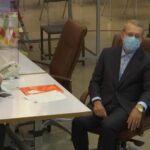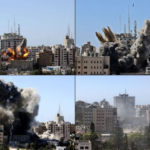withdrawing from the country and the peace talks have stalled amidst a sharp increase in violence, President Ashraf Ghani has emphasized the need for a decision on peace by the region and for Europe’s further role to “get Pakistan on board.”
Quoted in an interview by Der Spiegel on Friday, President Ghani said Europeans, especially Germany, “can do a lot” in the peace process with the Taliban.
He said that Pakistan as a state has to make an important decision on Afghan peace.
“Clear messages and incentives from Germany will help – and, conversely, they should introduce sanctions if the decision goes in a different direction than hoped,” Ghani said. “As Europeans, you should not see yourself as observers; you are a direct part of these events.”
Asks if a future security agreement between Afghanistan and Pakistan is the key to peace, Ghani said that it is “most certainly an important key” but added that his “goal is the neutrality of Afghanistan.”
“We don’t want a new protecting power, and we don’t want to be part of regional or international rivalries,” Ghani said as quoted in the interview.
He said peace will primarily be decided upon regionally and that “we are at a crucial moment of rethinking.”
“It is first and foremost a matter of getting Pakistan on board,” Ghani said in the interview. “The US now plays only a minor role. The question of peace or hostility is now in Pakistani hands.”
In response to a question about the influence of the Pakistani government on the Taliban, Ghani said Pakistan operates an organized system of support.
He said that “the Taliban receive logistics” in Pakistan, “their finances are there, and recruitment is there.”
He added: “The names of the various decision-making bodies of the Taliban are Quetta Shura, Miramshah Shura and Peshawar Shura – named after the Pakistani cities where they are located. There is a deep relationship with the state.”
His remarks came a day after his meeting with Pakistan army chief Gen. Qamar Javed Bajwa.
Ghani said that in their meeting, Bajwa clearly assured him “that the restoration of the Emirate or dictatorship by the Taliban is not in anybody’s interest in the region, especially Pakistan.”
But Ghani said that Bajwa told him that “some of the lower levels in the [Pakistani] army still hold the opposite opinion in certain cases.”
President Ghani said that in any case, “Western diplomacy should stop coddling” the Taliban.
He said that the Taliban made the environment for recent attacks, including the attack on Kabul school, and that the group has not cut its ties with al-Qaida.
About his efforts to build consensus around peace and to form a state council, Ghani said he is making his utmost efforts to form the country and that the peace process is a fundamental scenario.
“Once the Taliban realize that they cannot overthrow the government, they will need to come to peace as the dominant scenario,” he added.
Ghani expressed his concerns about the possibility of a civil war in the country as a result of the full withdrawal of foreign troops from the country but reiterated that “it doesn’t have to come to that.”
Ghani on Friday met Abdullah Abdullah, the head of the High Council of National Reconciliation, and former president Hamid Karzai as part of efforts to develop national and political consensus around peace.
The country’s political situation, the peace process, strengthening of political consensus and ensuring a just and lasting peace in the country were discussed in the meeting, the Presidential Palace said.
Sources said the Presidential Palace believes that the creation of the state council will help to increase meetings and consultations among the country’s political leaders for better management of the peace process after the withdrawal of foreign forces from the country.













